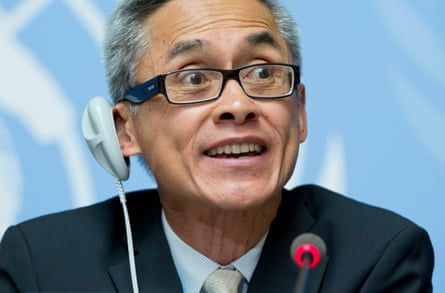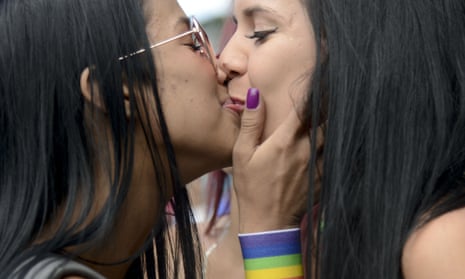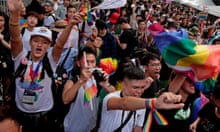In the last 12 months, Martin Luther King’s “arc of the moral universe” has bent towards lesbian, gay, bisexual, transgender and intersex (LGBTI) human rights.
Nauru and Belize decriminalised homosexuality and the Seychelles parliament passed a bill ending the ban on same-sex relations. In India, the supreme court said it will review its 2013 judgement that upheld the colonial-era law criminalising “carnal intercourse against the order of nature”.
More reasons to be cheerful: Greece, Slovenia and Bosnia-Herzegovina enacted new statutes to protect sexual and gender minorities from discrimination. Same-sex marriage was legalised in Colombia, Gibraltar, Isle of Man, Guernsey and the British Antarctic Territory. Italy became the 27th country in Europe to officially recognise same-sex couples, approving the law on civil unions. Similar civil unions were agreed by lawmakers in the Caribbean island of Aruba.
Meanwhile, a cross-party coalition of Guatemalan politicians began pushing for marriage equality and Taiwan’s legislature passed the first draft of a bill for same-sex marriage. Voices have also been raised for equal marriage in Cuba, Nepal and Vietnam.
There was more progress at the UN, with Thai law professor Vitit Muntarbhorn appointed the UN’s first independent investigator to protect LGBTI people from violence and discrimination, with a mandate to examine violence and discrimination against sexual and gender minorities.

There remain 75 countries and dependent territories that still criminalise same-sex relations – with nearly half of these jurisdictions outlawing both male and female homosexuality. The total increased by one in 2016 when the Chad parliament voted to criminalise same-sex acts for the first time in its history, albeit as a misdemeanor punishable by a fine and suspended prison sentence.
Both in countries that do and don’t criminalise same-sex behaviour, hundreds of millions of LGBTI people are at risk of “honour” killing by family members, mob violence and discrimination in housing, employment, healthcare, education and the provision of goods and services – much of it orchestrated by religious zealots and opportunistic politicians, as witnessed in Russia and Nigeria.
Ongoing anti-LGBTI backlashes continue in about 20 of the 193 UN member nations, where state repression and public hostility are increasing, including Ethiopia and Indonesia. But these are minority setbacks. Overall, LGBTI rights are mostly powering ahead.
During 2016, notable advances were won for trans and, to a lesser extent, intersex people. The Chilean Ministry of Health instructed health providers to stop “normalising” medical interventions on intersex infants and children. This is the first time that any health ministry in the world has taken such a step without being required to do so by legislation or legal action.
Coinciding with Intersex Awareness Day on 26 October, a group of UN and international human rights experts called for an urgent end to human rights violations against intersex people, including unwarranted surgical interventions and the non-recognition of a person’s intersex status.
Last year was the year of the biggest global wins for trans communities. Courts in Lebanon and Malaysia ruled in favour of trans people who wanted their identity documents to reflect their gender identity. A Chinese court in Guizhou province backed a trans man who sued his employer for unlawful dismissal. Vietnam and Bolivia amended their laws to allow trans people the right to change gender in legal documents. The Lahore high court in Pakistan decreed that it is a violation of human rights to exclude trans people from the national census. Furthermore, Geraldine Roman became the first elected transgender congresswoman in Philippine history.

On the wider LGBTI front, Malta approved bills to ban gay conversion therapy and the pathologisation of trans identities. The World Psychiatric Association also spoke out against gay “cure” programmes, stating: “There is no sound scientific evidence that innate sexual orientation can be changed”.
Some of the gains in 2016 were in unlikely countries, where LGBTI activists and their straight allies are risking their liberty and lives to push for acceptance and equality.
Despite the threats from anti-gay Islamists, the Tunisian LGBTI advocacy group Shams won a legal challenge against a government order that forced it to suspend operations. The government of Botswana was ordered by the country’s court of appeal to allow the official registration of the LGBTI organisation LeGaBiBo.
In Iraq, the Kurdish human rights group Rasan Organisation painted murals at high schools as part of an education campaign to draw attention to LGBTI rights, gender equality and domestic violence.
Despite this progress in 2016, there is still much work to do. Homosexuality remains criminalised in 36 out of the 52 Commonwealth member states (down from 46 a decade ago). Most of these anti-gay laws were imposed by Britain during the colonial era. They are not authentic national statutes. This legal persecution is happening despite the Commonwealth charter pledging human rights for all Commonwealth citizens.
For six decades, successive Commonwealth summits have refused to even discuss – let alone support – equality and non-discrimination for LGBTI people in the member states. The Peter Tatchell Foundation is supporting a coalition – the Commonwealth Equality Network, coordinated by Kaleidoscope Trust – which is lobbying to get LGBTI rights on the agenda of the 2018 Commonwealth summit.
At the very minimum, consistent with the Commonwealth charter, member states should: decriminalise homosexuality; prohibit discrimination based on sexual orientation and gender identity; enforce existing laws against threats and violence, to protect LGBTI people from hate crimes; and consult with LGBTI communities.
I am not sure we’ll get the Commonwealth summit to discuss these issues but we’re determined to try – again – for the tenth time. One thing is for sure: no injustice lasts forever. LGBTI freedom has been long delayed but it cannot and will not be denied.
Peter Tatchell is director of the Peter Tatchell Foundation. He is answering questions on how to better lobby for LGBT rights around the world during a live online discussion from 2pm-3.30pm on Monday 20 February. Follow the conversation on Twitter using #LGBTChange.
Join our community of development professionals and humanitarians. Follow @GuardianGDP on Twitter.











